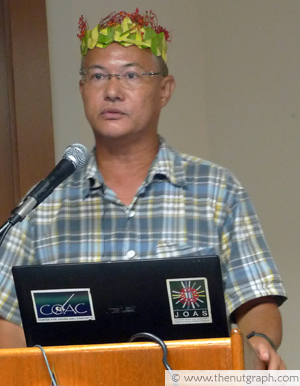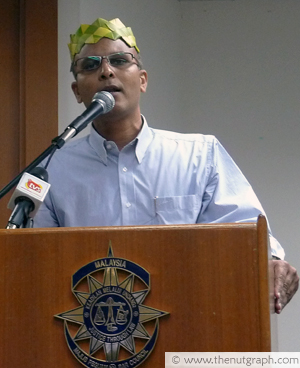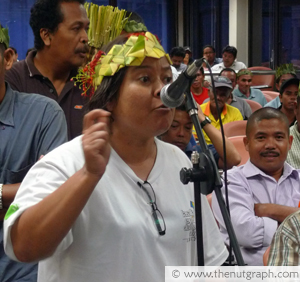IN the upcoming Galas by-election, Umno is expected to harp on “Ladang Rakyat”, a PAS state government development project that has reportedly benefited a private company over the rights of settlers. While Umno is championing the land rights of Malay Malaysian settlers, however, the Orang Asli remain one of the most impoverished communities under the Barisan Nasional (BN) government.

In the name of development, customary lands belonging to the indigenous peoples have been seized; their forests, houses and crops destroyed with minimal or zero compensation. And yet, Umno has announced its determination to win the votes of the 2,000 Orang Asli voters in the by-election.
How it will do that will soon be revealed when campaigning begins. What is more significant though is that over the years, the BN government has systematically used the Aboriginal Peoples Act 1954 and Jabatan Hal Ehwal Orang Asli (JHEOA) to exert control over Orang Asli communities. A new land policy the BN government passed in 2009 looks set to further restrict indigenous rights even as Umno clamours for settlers’ land rights.
Problematic new land policy
The National Land Council, chaired by Deputy Prime Minister Tan Sri Muhyiddin Yassin, passed a controversial Orang Asli land policy in December 2009. Muhyiddin claimed the new policy would help to eradicate poverty among the indigenous communities in the peninsula.

However, over 2,000 Orang Asli marched to the Prime Minister’s Office in March 2010 to submit a memorandum in protest of the policy that was passed without consultation with the indigenous communities.
Under the new policy, instead of recognising Orang Asli rights over their customary lands, the state would instead “give” them between 0.8 to 2.4 ha of land per family, and an additional 5,000 square feet to build houses.

But Centre for Orang Asli Concerns coordinator Dr Colin Nicholas warns that under the policy, it is likely the Orang Asli will no longer be recognised as indigenous peoples.
“One of the key elements in the definition of indigenous peoples is their collective attachment and control over a particular customary land,” he said in a 9 Oct 2010 Bar Council forum in Kuala Lumpur. Nicholas noted that the new land policy does not take into account the Orang Asli’s unique way of life and the diversity of their traditional land use practices.
“Unlike the Malay [Malaysians] who have their Malay reserves, and the Sabah and Sarawak natives who can make a claim over their native customary rights (NCR) lands, the Orang Asli will only be accorded individual land titles,” Nicholas explained.
Furthermore, only sanctioned development agencies, not Orang Asli themselves, would be allowed to develop the lands. In other words, the Orang Asli would have little control over their land.
Additionally, the communal customary lands known as tanah adat or “roaming areas” will be lost to the Orang Asli under the proposed amendments to the Aboriginal Peoples Act 1954. The Orang Asli would also be prohibited from making land claims in court once they accept the government’s land titles.
Nicholas claimed the new land policy was the federal government’s reaction to restrict Orang Asli land rights after the Adong Kuwau and Sagong Tasi landmark rulings, which extended recognition of Orang Asli rights to their traditional lands and resources.
Aboriginal Peoples Act
Apart from the new land policy, the BN government has also yet to amend or repeal the problematic Aboriginal Peoples Act 1954 that does not fully recognise Orang Asli land rights.
A colonial product, the law was supposed to “provide for the protection, well-being and advancement of the aboriginal peoples of Peninsular Malaysia”.

However, lawyer Augustine Anthony pointed out during the Bar Council forum that all 19 sections in the Act need to be amended, if not repealed.
“For example, under Section 3(3) of the Act, it is the minister that decides who is an Orang Asli (not the Orang Asli themselves).
“Also, under the Act, an aboriginal area or reserve can be changed to Malay reserve or a forest reserve by the state at will,” said Anthony, adding that the Orang Asli cannot transfer, lease or sell their land without the consent of the director-general of Orang Asli affairs.
“Clearly, the Act was established by the British to exert control over the Orang Asli communities during the communist era,” said Anthony. And the BN government has continued to use the same tool to control the Orang Asli since independence.
Who is responsible?

Conducted in Bahasa Malaysia, close to 200 Orang Asli attended the Bar Council forum that sought Orang Asli feedback on the new land policy. All voted against the new policy.
Additionally, many spoke out against JHEOA and the BN government during the forum. A few complained that the politicians would make sweet promises to grant them land titles during election campaigns, but disappear without a trace after that.
“We can always blame the government, but the way I see it, we Orang Asli must unite and stand up for ourselves, too,” said Tijah Yok Chopil from Jaringan Kampung Orang Asli Semenanjung Malaysia.

“We can’t keep thinking that all our problems including our land woes will be solved once we vote for a particular party. BN or Pakatan candidates, we can’t just sit down [and wait for them to fulfil their election promises]. We need to look for them after the elections,” Tijah, a Semai, said.
Indeed, while civil society and the Bar Council may help to amplify indigenous voices, it is still up to the Orang Asli to continue to pressure the federal and state governments to uphold their rights and fulfil election promises. The Galas by-election will provide just the opportunity to keep doing so. ![]()
Gan Pei Ling wishes governments would stop trampling on nature and the indigenous communities in the name of “development”.
[related-posts]


Farouq Omaro says
A marginalised and economically weak community will always find itself difficult to unite because there are amongst them those who are easily swayed by money and a little power. I salute the Orang Asli for being able to come together for the forum and for their previous effort in marching to the PM’s office. Even the Kadazandusuns and Muruts in Sabah have yet to do this. But then again, who’s complaining?
Merah Silu says
“Conducted in Bahasa Malaysia”, close to 200 Orang Asli attended the Bar Council forum that sought Orang Asli feedback on the new land policy.
Wow, why must the article highlight this statement? Maybe the Bar Council always uses English, the unofficial language of the colonial British. I thought the forum was in London. Or maybe the forum was organised by the remnant agent of the illegitimate British occupier.
JW Tan says
You haven’t spent very much time with Orang Asli. Many of them don’t speak Bahasa Malaysia that fluently — it’s a second language for them, and given the high poverty rate, many don’t get a chance to learn it in school either.
So, yes, it’s interesting that the forum was conducted in BM, and not in Semelai, for example. Of course, BM is probably the only language that could work as a lingua franca.